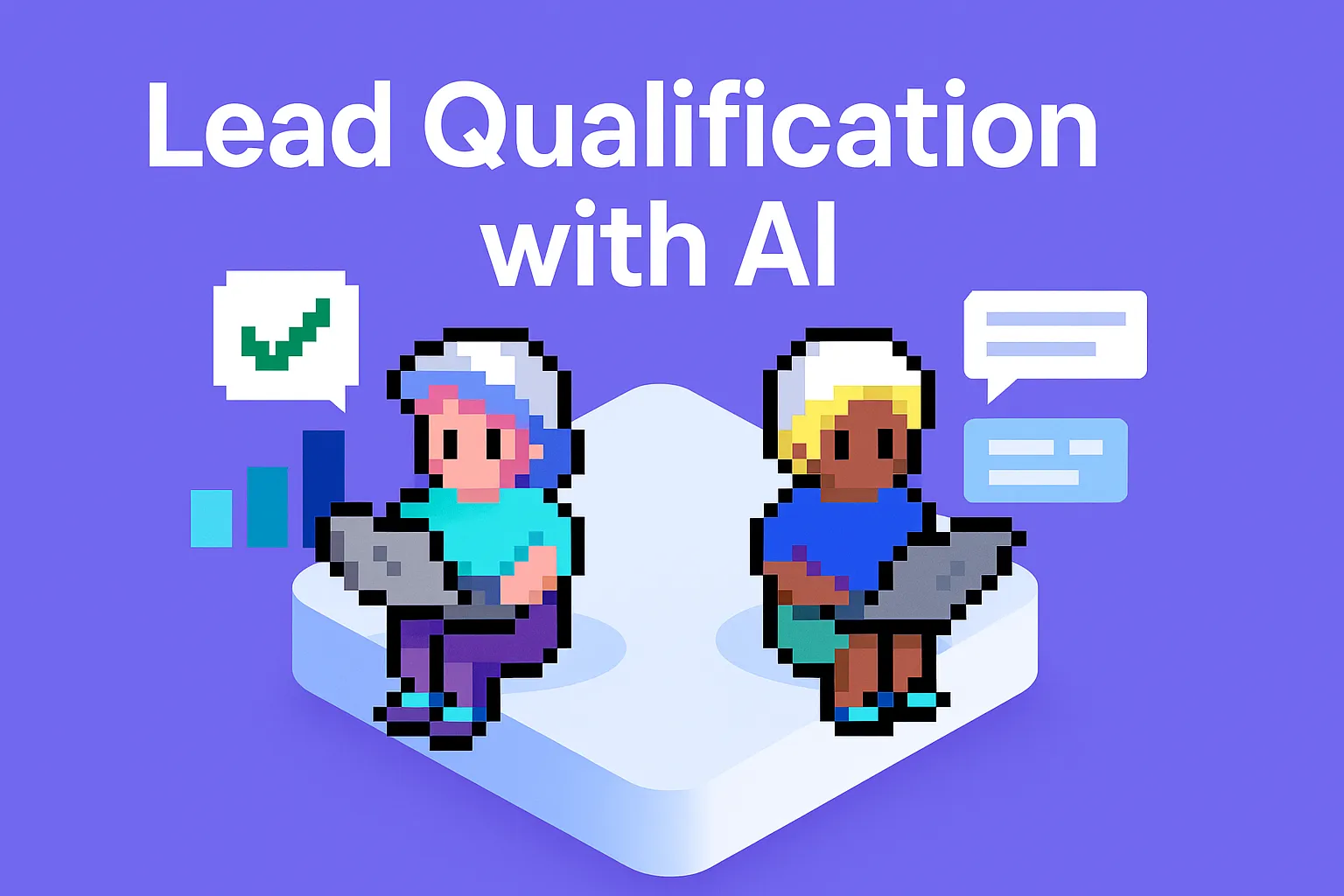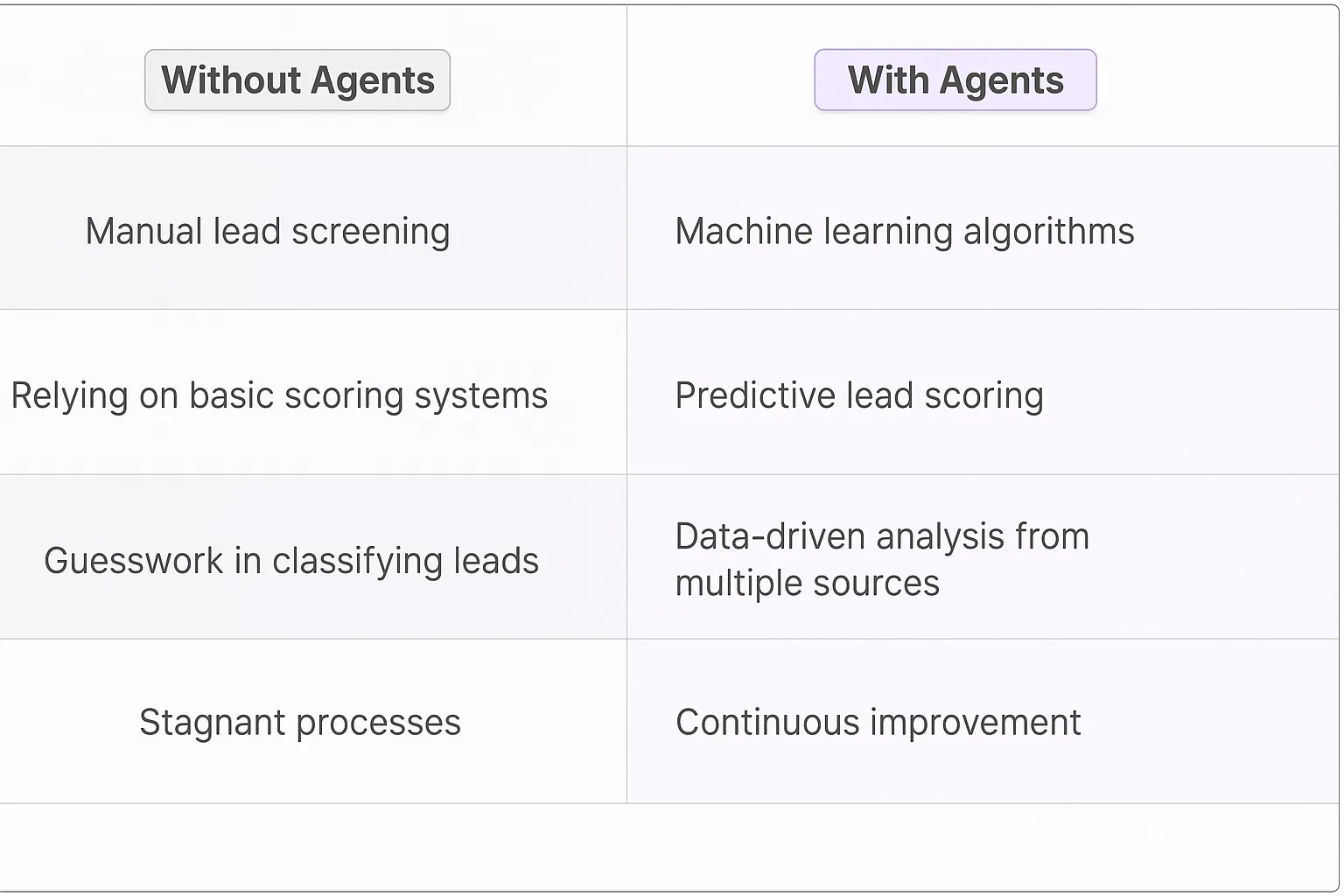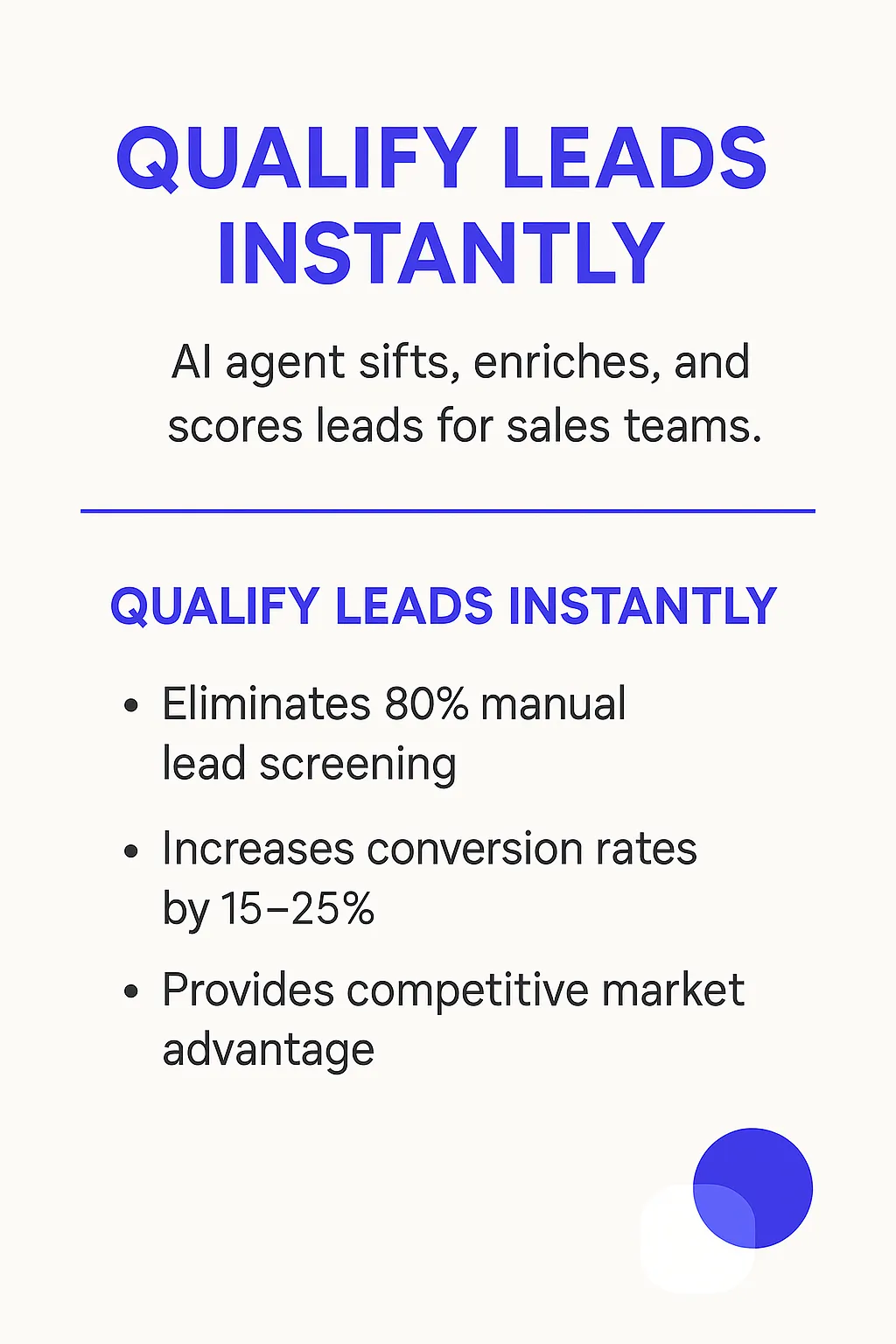Lead Qualification AI Agents
The Evolution of Lead Qualification with AI Agents
Lead qualification is the process of evaluating potential customers to determine their likelihood of making a purchase. It's the art and science of separating the wheat from the chaff in your sales funnel. Traditionally, this involved manual screening, basic scoring systems, and a lot of guesswork. But in the age of big data and AI, lead qualification has evolved into a sophisticated, data-driven practice that can predict buyer behavior with uncanny accuracy.
Modern lead qualification powered by AI agents brings a suite of game-changing features to the table:1. Data Analysis at Scale: AI can process and interpret vast amounts of data from multiple sources, including website interactions, email responses, and social media engagement.2. Predictive Scoring: Using machine learning algorithms, AI agents can assign dynamic scores to leads based on their likelihood to convert.3. Personalization: AI enables tailored interactions with leads based on their specific characteristics, behavior, and preferences.4. Continuous Learning: These systems improve over time, learning from each interaction to refine their qualification criteria.5. Real-time Insights: AI agents provide up-to-the-minute analysis, allowing sales teams to strike while the iron is hot.6. Automated Engagement: From initial outreach to follow-ups, AI can handle routine communications, freeing up human resources for high-touch interactions.

Benefits of AI Agents for Lead Qualification
What would have been used before AI Agents?
Before AI agents entered the scene, lead qualification was a manual grind. Sales teams would spend hours sifting through spreadsheets, making cold calls, and sending countless emails. It was like trying to find a needle in a haystack, but the haystack was made of potential customers and the needle was that perfect lead.
Companies relied on basic scoring systems, often just glorified Excel formulas, to rank leads. These systems were about as sophisticated as a Magic 8-Ball, frequently misclassifying hot leads as cold and vice versa. The result? Sales teams wasted time chasing ghosts while genuine opportunities slipped through the cracks.
What are the benefits of AI Agents?
Enter AI agents for lead qualification. These digital teammates are like having a team of data scientists, psychologists, and sales gurus working 24/7 to identify your best leads. They're not just faster; they're smarter and more adaptable than any static system.
AI agents can process vast amounts of data from multiple touchpoints - website interactions, email responses, social media engagement - to build a comprehensive profile of each lead. They're not just looking at what a lead says they want; they're analyzing behavior patterns to predict what they'll actually do.
The real game-changer is the AI's ability to learn and improve over time. Every interaction, every closed deal, every lost opportunity feeds back into the system, making it sharper and more accurate. It's like having a sales team that gets exponentially better with each passing day.
But here's where it gets really interesting: AI agents can personalize the qualification process at scale. They can tailor questions and interactions based on a lead's specific characteristics, industry, or behavior. This level of customization was previously impossible without an army of sales reps.
The result? Higher quality leads, shorter sales cycles, and dramatically improved conversion rates. Sales teams can focus their energy on closing deals rather than prospecting, while marketing can fine-tune their strategies based on AI-driven insights.
In the end, AI agents for lead qualification aren't just tools; they're catalysts for a fundamental shift in how companies approach sales and marketing. They're turning what was once a hit-or-miss process into a precise, data-driven science. And in today's competitive landscape, that's not just an advantage - it's a necessity.
Through advanced data enrichment capabilities, these AI agents can transform basic lead information into comprehensive customer profiles that drive better qualification decisions.

Potential Use Cases of AI Agents for Lead Qualification
Processes
Lead qualification is a critical yet often time-consuming process for sales teams. AI agents are stepping in to transform this landscape, offering a blend of efficiency and intelligence that's hard to match. These digital teammates can sift through vast amounts of data, identify patterns, and make decisions at a speed that would make even the most caffeinated sales rep's head spin.
One of the most compelling use cases is in the initial screening of leads. AI agents can analyze incoming leads against predefined criteria, assessing factors like company size, industry, budget, and engagement history. They're not just ticking boxes; they're using machine learning algorithms to understand the nuances of what makes a lead truly qualified for your specific product or service.
Another process where AI shines is lead scoring. Instead of relying on static rules, these agents can dynamically adjust scoring models based on historical data and current market trends. They're constantly learning, refining their understanding of what makes a lead likely to convert, and adjusting their assessments in real-time.
Tasks
When it comes to specific tasks, AI agents are proving to be invaluable allies in the lead qualification trenches. They can automate the initial outreach, sending personalized messages to leads based on their characteristics and behaviors. This isn't your grandfather's mail merge - we're talking about sophisticated communication that adapts based on the recipient's responses and engagement.
Data enrichment is another task where AI agents excel. They can scour the internet and various databases to fill in the gaps in lead profiles, providing sales reps with a more complete picture of potential customers. This goes beyond just finding a phone number or job title; these agents can uncover insights about a company's tech stack, recent funding rounds, or even sentiment towards your brand based on social media activity.
Perhaps one of the most exciting applications is in predictive lead qualification. AI agents can analyze historical data to identify patterns that indicate a high likelihood of conversion. They're not just looking at obvious signals like company size or industry; they're uncovering subtle correlations that human analysts might miss. Did the lead visit your pricing page three times in the last week? Did they download a whitepaper on a topic related to your product? The AI agent is connecting these dots to paint a picture of lead quality.
The beauty of these AI agents is that they're not replacing human sales reps; they're augmenting them. They're handling the grunt work, the data crunching, and the initial filtering, allowing sales teams to focus their energy where it matters most - on building relationships and closing deals with the most promising leads.
As these AI agents continue to evolve, we're going to see even more sophisticated applications. Imagine an AI that can predict not just whether a lead will convert, but when they're most likely to do so, allowing sales teams to time their outreach for maximum impact. Or an AI that can identify cross-selling opportunities by analyzing a lead's behavior across multiple product lines.
The lead qualification game is changing, and AI agents are the power players. They're not just making the process more efficient; they're making it smarter, more adaptive, and ultimately more effective. For sales teams willing to embrace this technology, the potential for growth is enormous. It's not about replacing the human touch in sales; it's about amplifying it, focusing it where it can have the greatest impact. Welcome to the future of lead qualification - it's AI-powered, data-driven, and it's here to stay.

Industry Use Cases for Lead Qualification AI Agents
The impact of AI agents on lead qualification is reshaping how businesses approach potential customers across sectors. These digital teammates are becoming indispensable, offering a blend of efficiency and insight that human teams alone struggle to match. Let's dive into some concrete examples of how different industries are leveraging AI for lead qualification, transforming their sales funnels and customer acquisition strategies.
From tech startups to established financial institutions, the applications are as diverse as they are powerful. We're seeing AI agents that can sift through mountains of data, identify patterns invisible to the human eye, and engage with leads in ways that feel surprisingly personal. This isn't just about automating repetitive tasks; it's about unlocking new levels of understanding and engagement with potential customers.
As we explore these use cases, keep in mind that we're just scratching the surface. The potential for AI in lead qualification is vast, and innovative companies are constantly finding new ways to apply these technologies to their unique challenges and opportunities.
Advanced customer segmentation capabilities allow these AI agents to categorize leads with unprecedented precision, while sophisticated sales forecasting models help predict conversion likelihood and optimal timing for engagement.
Real Estate: Transforming Lead Qualification with AI
The real estate industry is ripe for disruption, and lead qualification AI agents are poised to be the game-changer. Let's dive into how these digital teammates can revolutionize the way realtors handle potential clients.
First off, consider the sheer volume of inquiries a successful real estate agency receives daily. It's a firehose of data - from casual browsers to serious buyers, from first-time homeowners to seasoned investors. Traditionally, sorting through this deluge has been a time-consuming, often hit-or-miss process.
Enter lead qualification AI agents. These aren't your grandfather's chatbots. We're talking about sophisticated systems that can analyze patterns in user behavior, interpret nuanced language, and make predictive assessments about a lead's likelihood to convert.
Imagine an AI that can engage with a potential buyer, asking targeted questions about their budget, preferred neighborhoods, and timeline for purchase. But it doesn't stop there. The AI can cross-reference this information with market trends, property availability, and even the user's browsing history on the agency's website.
The result? A comprehensive lead profile that goes beyond surface-level data. The AI can assign a qualification score to each lead, prioritizing those most likely to result in a sale. This isn't just about efficiency; it's about precision targeting that can dramatically increase conversion rates.
But here's where it gets really interesting. These AI agents can learn and adapt over time. They can identify patterns in successful conversions and refine their qualification criteria accordingly. They're not just following a static script; they're evolving with the market.
For realtors, this means spending less time on administrative tasks and more time doing what they do best - closing deals. It's not about replacing human expertise; it's about augmenting it. The AI handles the initial screening, allowing agents to focus their energy on leads that are genuinely promising.
The potential ripple effects are significant. More efficient lead qualification could lead to faster property turnover, more satisfied clients, and ultimately, a more dynamic real estate market. It's a win-win-win scenario for agents, buyers, and sellers alike.
As we look to the future, the integration of lead qualification AI in real estate isn't just a nice-to-have - it's going to be a critical competitive advantage. The agencies that embrace this technology early and effectively will be the ones setting the pace in an increasingly digital-first industry.
Advanced lead scoring algorithms help real estate professionals identify the most promising prospects from their pool of inquiries, ensuring maximum efficiency in their sales efforts.
E-commerce: AI-Powered Lead Qualification Reshapes Online Retail
The e-commerce landscape is a battlefield of attention, and lead qualification AI agents are the secret weapons smart retailers are deploying. Let's break down how these digital teammates are transforming the way online stores convert browsers into buyers.
E-commerce sites face a unique challenge: an overwhelming influx of traffic, but only a fraction of visitors with genuine purchase intent. Traditional methods of lead scoring often fall short, relying on simplistic metrics that fail to capture the nuanced behavior of online shoppers.
AI-powered lead qualification changes the game entirely. These aren't just passive data collectors; they're proactive engagement engines. They analyze a visitor's journey through the site, from the pages they linger on to the products they add to (and remove from) their cart. But that's just the beginning.
The real magic happens when these AI agents start correlating on-site behavior with external factors. They can tap into social media sentiment, seasonal trends, and even local events that might influence purchasing decisions. For instance, an AI might identify a surge in searches for winter coats in a region experiencing an unseasonably cold snap, flagging these visitors as high-priority leads.
What's more, these AI agents can engage in real-time personalization at a scale that would be impossible for human teams. They can dynamically adjust product recommendations, tweak pricing strategies, and even modify the user interface based on a visitor's behavior patterns. This level of customization creates a shopping experience that feels tailor-made, significantly boosting the likelihood of conversion.
But here's where it gets really interesting: these AI agents don't just qualify leads; they nurture them. They can initiate perfectly timed follow-ups, whether through personalized recommendations, targeted ads, or even customized on-site messaging. They're not just identifying potential customers; they're guiding them through the entire purchase journey.
For e-commerce businesses, this translates to a dramatic shift in resource allocation. Instead of casting a wide net and hoping for the best, they can focus their marketing spend and human touchpoints on leads with the highest probability of conversion. It's a move from quantity to quality that could redefine ROI in digital retail.
The implications extend beyond individual sales. These AI agents are constantly learning, building a rich tapestry of customer insights that can inform everything from inventory management to long-term business strategy. They're not just tools for conversion; they're engines of business intelligence.
As we look ahead, the e-commerce players who leverage AI for lead qualification won't just be optimizing their sales funnel; they'll be creating entirely new paradigms of customer engagement. In a world where attention is the scarcest resource, these AI-powered strategies aren't just an advantage – they're becoming a necessity for survival in the digital marketplace.
Sophisticated email campaigns powered by AI can automatically nurture qualified leads with targeted content that moves them closer to purchase decisions.
Considerations
Technical Challenges
Implementing a Lead Qualification AI Agent isn't just about plugging in some fancy algorithm and watching the magic happen. It's a complex dance of data, integration, and machine learning that can make even seasoned tech veterans break out in a cold sweat.
First off, you're dealing with data quality issues that would make Marie Kondo weep. Most companies' CRM systems are a hot mess of incomplete fields, outdated information, and straight-up errors. Your AI is only as good as the data it's fed, so you'll need to embark on a data cleansing crusade that'll make you question your life choices.
Then there's the integration nightmare. Your lead qualification agent needs to play nice with your existing tech stack - CRM, marketing automation, sales tools, and probably that ancient system Bob from accounting refuses to let go of. It's like trying to get a group of toddlers to form an orderly line; theoretically possible, but in practice, a herculean task.
Let's not forget about the machine learning model itself. You'll need to train it on historical data, but here's the kicker - your past lead qualification process was probably flawed. So you're essentially teaching a new dog old tricks, some of which might be bad habits. It's a classic "garbage in, garbage out" scenario that'll keep you up at night.
Operational Challenges
On the operational front, you're not just implementing a tool; you're orchestrating a cultural shift that'll make your change management skills look like a game of checkers in a world of 4D chess.
Your sales team, those charming individuals who swear by their "gut feeling," will now need to trust an AI to tell them which leads are worth pursuing. It's like telling a chef to let a robot taste their soup. Expect resistance, skepticism, and maybe a few dramatic exits.
Then there's the question of how to handle the AI's output. Do you let it automatically assign lead scores? Or do you have a human in the loop to double-check? If it's the former, you risk missing out on potential unicorns that don't fit the AI's criteria. If it's the latter, you're adding a layer of complexity that might negate the efficiency gains you were aiming for.
And let's talk about the elephant in the room - what happens when the AI gets it wrong? Because it will. You'll need a robust feedback loop and a process for continuous improvement. But more importantly, you'll need a way to manage expectations. Your C-suite might be expecting HAL 9000, but in reality, you're delivering something closer to a very smart, but occasionally confused, intern.
Implementing a Lead Qualification AI Agent is not for the faint of heart. It's a journey that'll test your technical prowess, change management skills, and patience. But for those who can navigate these choppy waters, the potential rewards - increased efficiency, better-qualified leads, and ultimately, more closed deals - can be game-changing. Just remember, it's a marathon, not a sprint. And maybe keep a stress ball handy. You're gonna need it.
The Future of Sales: AI-Powered Lead Qualification
Lead qualification AI agents are not just a trend; they're a paradigm shift in how businesses approach sales and marketing. By leveraging the power of machine learning and big data, these digital teammates are enabling companies to identify and nurture high-quality leads with unprecedented accuracy and efficiency. The benefits are clear: higher conversion rates, shorter sales cycles, and more targeted use of human resources. However, implementing these systems comes with its own set of challenges, from data quality issues to cultural resistance within organizations.
As we look to the future, the companies that successfully integrate AI-powered lead qualification into their processes will have a significant competitive advantage. They'll be able to scale their sales efforts, provide more personalized customer experiences, and make data-driven decisions that drive growth.
The lead qualification landscape is evolving rapidly, and AI agents are at the forefront of this revolution. For businesses willing to embrace this technology and navigate its challenges, the potential for transformation is enormous. The future of sales is here, and it's powered by AI.
Advanced customer segmentation and sales performance analytics will continue to evolve, providing even deeper insights into lead behavior and conversion patterns.













